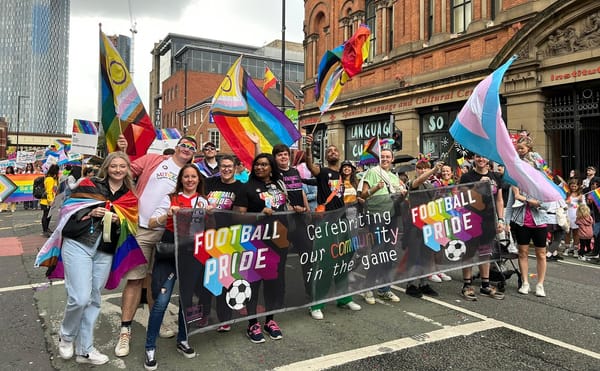How my trans identity helped me learn to love football again
What happens when your love of football makes your gender dysphoria worse.
What happens if you’re a football fan but, after finding your trans identity, you find yourself increasingly alienated by the masculine stereotypes associated with football?
That’s what James Cardy (they/she), a student in London, explores in this article.
By James Cardy
“I just get it now! I’m not watching football as a man. It makes so much more sense as a woman!”
That’s what my best friend Joan, also a trans woman, said to me during the 2022 World Cup.
I instantly understood this feeling. The feeling of rejecting masculinity when it comes to football. The distancing of yourself from that masculinity that now comes with being a football fan.
I have been a huge fan of most sports for as long as I can remember, and football dominated that passion. I played it almost every day as a kid and being an Arsenal fan became a defining part of my identity. My life revolved around our next game. I’d want to talk about it constantly.
But that innocent passion stopped at around 14. I became very aware of the perception of the football fan by others. I recognised that by being a football fan, you put yourself into the box with all other football fans. The image of toxic masculinity that has been played over and over in the media for decades of the loud, drunk, violent male football fan, and you couldn’t escape it. Pints down the pub, fighting in the streets: football has traditionally been a quintessentially masculine pastime.
I felt gross at being a football fan.
I didn’t fully comprehend what I was feeling at the time, but looking back I can tell that I was experiencing very serious gender dysphoria.
When people found out that I was a football fan, their perception of me would change, and not necessarily in a negative way for them. They’d perceive me in the way that they have been told to perceive football fans: as stereotypically male.
But I couldn’t live with that. The part of my life which was so unequivocally joyous, started to turn into a source of discomfort for me. Football went hand in hand with masculinity, and therefore, with gender dysphoria. As I got older, I got other interests, and even though I never stopped supporting Arsenal, I distanced myself from this masculine pastime.
Before moving to university at 18, I made a conscious effort to instead focus on music that I like or books I enjoyed. I had only recently realised I was trans and being openly queer felt like a revelation at the time, and it was.
Living in an environment where I could completely reinvent myself felt like a cheat code for my identity; I could live entirely as someone that I chose to be, not someone who people had a chance to perceive.
But something was missing in all of that, something that had been a part of me my whole life. Football!
In my first year at university and living in London, I had grown as a person, met incredible friends, and for the first time (yet not the last time, oops) I changed my pronouns. But to achieve this and live how I thought that I wanted to, I had discarded my main passion in life. I forgot about football, I forgot about ambitions of being a sportswriter, and I denied myself that joy.
This is where Joan’s words really relate to my own journey. In the early stages of transition, or just being queer in general, there is so much personal change that it can be hard to comprehend or make sense of. I've found that sometimes the most impactful parts of self-realisation come from unexpected places.
For me, this was sport, and my place as a trans person within sport. As I got more comfortable in my own mind, I looked back on the role of football in my life and realised that the reason I felt so embarrassed admitting that I was a football fan was because of the perception that caused.
Watching football as a woman felt normal, it was as if a weight had been lifted off of me. I had found out how to enjoy this passion again, whilst simultaneously validating my own identity in doing so.
Over time, though, I got more invested again. I resumed watching Arsenal religiously. I realised that I should stop caring how I am perceived as a football fan, because I am not that masculine stereotype. I am not a man. I wanted to be perceived as queer, as trans, as a woman, as non-binary, as all of these things.
As trans people, we often feel as though we have to fight for everything, and I’m so tired of it. I felt as though I had to fight for my identity as a football fan. I couldn’t bear to be seen as this masculine stereotype and even after coming out, I would always feel as though I had to defend my fandom.
Then, I had a conversation with a friend. I was heading to an LGBT talent identification day for sportswriters a few days later and I was scared. Here were the two elements of my life I was struggling to reconcile coming together. I was trying to focus on a big opportunity for myself and getting to meet people that I really looked up to, whilst simultaneously self conscious over how I would be perceived, or whether I would fit in at all.
I mentioned these anxieties to a friend, and they turned to me and said “James, it's about football and being queer. They’re literally the two things I identify most with you. You’ll do great!”
I realised that I had done it, I had created the identity that I didn’t know was possible. For years, being a football fan was something I hated about myself, the antithesis of my queer reality that I desperately wanted to be seen. But I now realised this just wasn’t the case anymore, I didn’t have to hide any part of myself. I didn’t achieve this through any conscious changes to myself, but just by allowing myself to be myself. My trans identity had helped me love football again. I’d broken free of the fear of being put in a box alongside the hyper-masculine stereotypes.
I hope that one day, queer people won’t have to go through the same experience that I did, and that they can enjoy football and sports in the way that I have since coming out. But the only way this is possible is by normalising queer people’s involvement in sports. My queer or trans friends: ignore your perception of what it means to be a football fan. Instead, enjoy football for the ridiculous, sometimes infuriating, but always incredible theatre that it is. You have the power: you can remove yourself from the masculine world of football, and introduce yourself to the queer one.
I get it now. I no longer have to watch football as a man. It makes so much more sense as myself — whether that be as a woman, as non-binary, or as unashamedly queer.
Thank you for reading Out and Out Football. We’re just starting out and need to spread the word far and wide. Will you share James’s essay with your friends?



